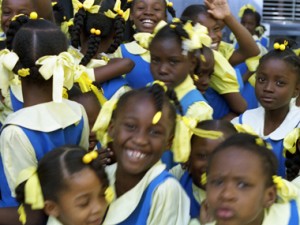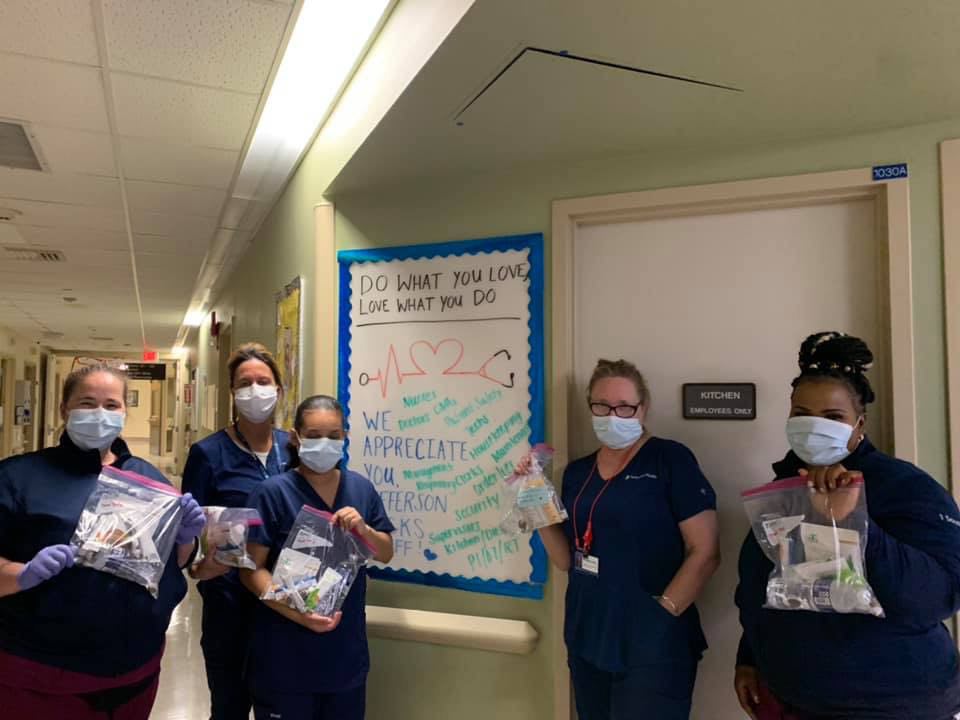Like most people, Philadelphia filmmaker Deirdre Maitre and her husband, Roosevelt, were glued to the television to watch the earliest reports of the devastating earthquake in Haiti two weeks ago.
But their interest was more personal than it was for most of us. They were scanning the screen for familiar places, familiar faces: Roosevelt’s family lives in Port-au-Prince, and Deirdre’s family founded a sustainable fish farming project on the property where the Daughters of Mary Queen Immaculate, a Haitian teaching order of nuns, operate several schools.
“It was horrendous not to know what had happened to our family and friends,” says Deirdre. “It was like walking around with a bowling ball in my stomach. We did not actually make contact with them on the phone until Friday, three days after the quake, and even then we were getting information little by little, various pieces of news from different people including my husband’s aunts, uncles and cousins here. He has a really close friend who was able to drive down via motorcycle to his mother’s neighborhood and check on them. They had a really close call. Some of their neighbors died.”
Dierdre and her husband are dealing with their grief by throwing themselves into the relief effort. Deirdre will be screening selections from two of the films she did as part of her master’s program at Temple University on Friday, January 29, at 7 PM, at the Irish Center, 6815 Emlen Street, in the Mt. Airy section of Philadelphia. “Fishing for the Future” documents the development of the Martha’s Vineyard Fish Farm for Haiti Project, founded by her aunt, Margaret Penicaud, whose family fishes on the island off the coast of Massachusetts. “Is God Sleeping?”, focuses on a young Haitian artist who is an illegal US immigrant.
She’ll be joined by Jean Marc Phanor, brother of Gilg Phanor, one of the first five Americans rescued from the rubble of the Hotel Montana in Petionville, who will tell his family’s story.
“What I want to do is highlight the organizations in my film and talk about their status to help personalize the situation,” says Deirdre. “Some of the NGOs in my film suffered significant damage. I’m hoping to help people learn about the various work people are doing there and hopefully give them some resources to help them decide where they want to help.”
Deirdre, who grew up in Massachusetts and is the granddaughter of Irish immigrants from County Cork, first traveled to Haiti in 1998 with her aunt, Margaret Penicaud. “She lived in France for many years and married a Frenchman,” Deirdre explains. “In her church, because she spoke French, she was introduced to a nun from Haiti, the mother superior of a teaching order of nuns. The Daughters of Mary Queen Immaculate invited her to Haiti to see their schools and she invited me to come along.”
From that visit grew the Martha’s Vineyard Fish Farm for Haiti Project, which, miraculously, survived the quake. Some of the schools and the nuns’ mother house were not so lucky. The buildings collapsed, and there was loss of life: one sister, one novice, a driver and his two children and 10 children living with the sisters. The nuns are sleeping in a tent in the courtyard. “My aunt has already started raising money for them,” says Deirdre, who fell in love with Haiti and its people during her first visit there.
“They are very authentic and vibrant,” she says. “They have a strong sense of community there. They are incredibly, deeply, profoundly spiritual. Not on an institutional level, not compartmentalized to church, but in their daily lives, in their dealings with one another. They’re very friendly, humanistic, and welcoming people. And with a profound sense of powerlessness, a complete loss of control of their destiny, in God’s hands completely.”
She met Roosevelt Maitre on that first trip and they became friends. Then, they became more than friends. The two were married in 2006. “Haiti has been very good to me,” she says with a smile. Roosevelt, now a buyer at Whole Foods, is a student at Community College of Philadelphia, studying management and business administration.
Like many who know Haiti well, Deirdre has been disappointed in the focus solely on the nation’s poverty, which, though real and vast, tells only part of Haiti’s story. The rest of the story is what she’s trying to relay through her films. “The NGOs I’ve been focused on aren’t relief efforts, they’re genuine partnerships with genuine leadership among Haitians,” she says.
Among them are Fonkoze, from a Creole phrase meaning “shoulder to shoulder,” that is Haiti’s largest microfinance institution offering financial services to the rural-based poor. Founded by a Catholic priest, Father Joseph Phillipe, and 34 other grassroots leaders and working with Peace Corps volunteer Anne Hastings, the little bank that could grew with fund supplied by investors from the US, the Netherlands, and elsewhere and now has millions of dollars—in part as the result of thousands of savings accounts established by Haitians.
Dr. Paul Farmer’s program, Partners In Health, has been bringing medical care to the poor for more than 20 years and is now in four countries. Farmer, a Harvard physician, is United Nations deputy special envoy to Haiti though he currently lives in Rwanda. After the quake, PIH set up field hospitals in Port-au-Prince and has 20 operating rooms up and running. Twenty-two planeloads of medical volunteers and thousands of pounds of medical supplies to support the more than 4,500 PIH medical personnel already on the ground. PIH medical personnel at the sister facility in Rwanda donated a percentage of their salaries to help.
The fourth NGO Deirdre plans to film is Cine Institute, Haiti’s first film school founded in the port city of Jacmel by filmmaker David Belle and supported by Hollywood money (director Francis Ford Coppola is on the board). “We were just in the process of setting up a time for me to visit when the quake hit,” she says. Cine Institute’s building was seriously damaged, but students dug through the rubble for their equipment and began roaming the streets to record the chaos. You can see their video reports and make a donation on their website.
“This has been a horrible, horrible tragedy,” says Deirdre, “but the focus on Haiti because of the earthquake could be a new beginning in so many ways. Time will certainly tell. Americans can play a big part in that.”
Learn what you can do to help Haiti on 7 PM Friday, January 29, at the Irish Center, 6815 Emlen Street, Philadelphia.


